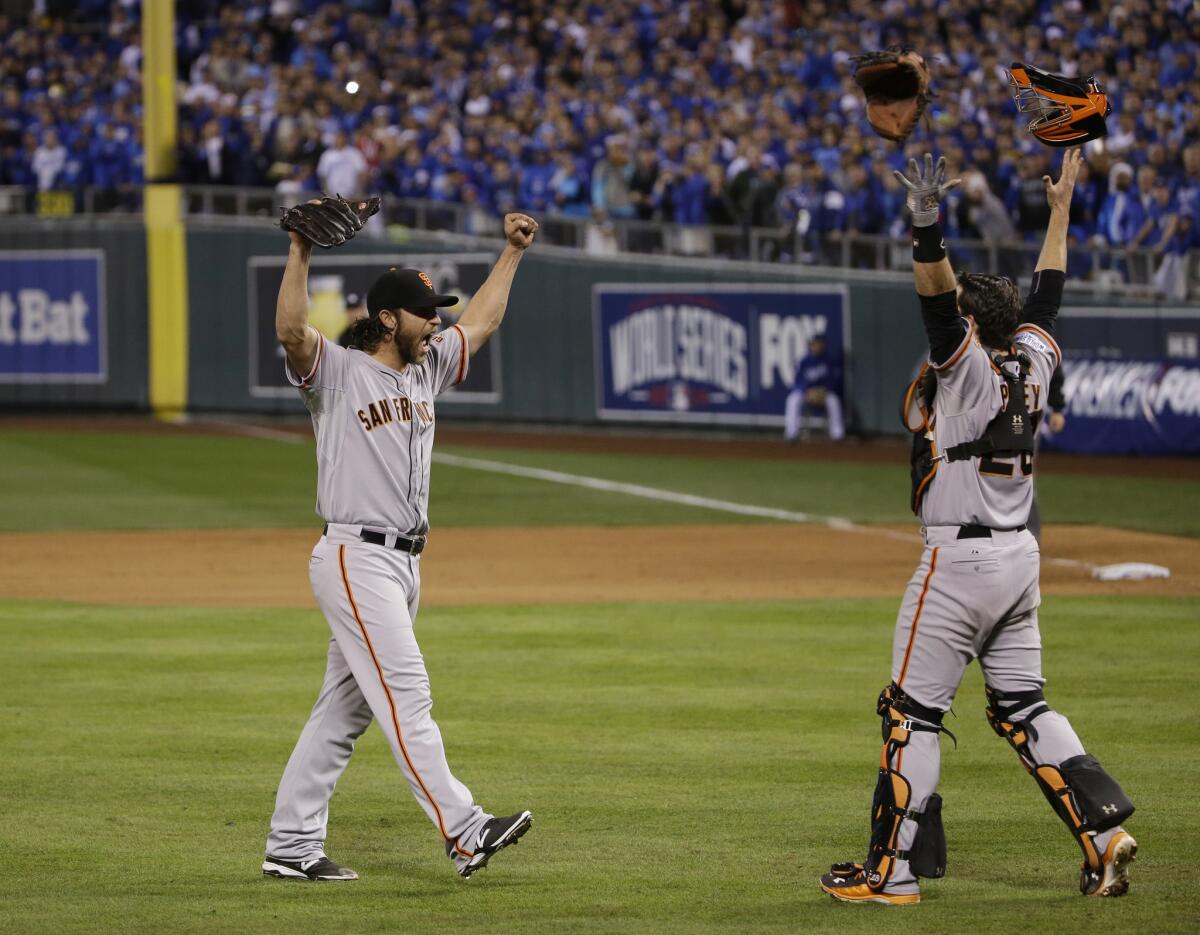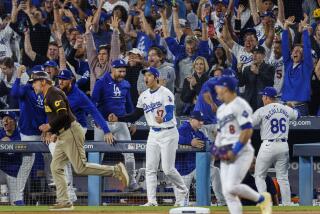Column: MLB needs to rekindle fan interest in the World Series

The pressure is off, America. The Fall-Over Classic is finished.
No more baseball games, better known as Four Hours With Strangers. No more fourth-place teams battling fifth-place teams for a first-place trophy. No more rules chaos, home-field confusion and seriously creepy Rob Lowe commercials.
It ended Wednesday after the only one of the seven games that folks actually watched. While Madison Bumgarner and the San Francisco Giants celebrated on the field, the real winners were those baseball fans finally assuaged of all guilt.
Youâre off the hook for another year, America. You no longer have to feel bad about not watching the World Series.
Even though the Game 7 victory by the Giants over the Kansas City Royals was watched by nearly 24 million viewers, that was nearly double the average of the previous six games, making this still the second-least watched World Series in history.
Baseballâs premier event was tackled for a huge loss by âSunday Night Football,â outsmarted by the âThe Big Bang Theoryâ and devoured by the zombies of âWalking Dead.â
Yes, there are many more channel choices than the days of, say, a 1978 Dodgers-New York Yankees series that drew a huge rating. But what explains a recent decline that shows five of the least-watched Series all occurring in the last seven years? Why has baseballâs World Series viewing been cut in half in the last 15 years?
Make no mistake, baseball is a thriving sport. Itâs financially stronger than ever. The Dodgers sold for more than $2 billion, then cut a cable television deal worth four times that amount. Baseballâs top-10 attendance totals have all occurred in the last 10 years.
People still love their hometown teams. The problem is, theyâre increasingly falling out of love with the actual game. The national pastime has sadly become a regional pastime. Every team has plenty of fans, but when those teams are eliminated from postseason, those fans stop watching because suddenly itâs all about only, ugh, the baseball.
Few people drive to their local stadiums saying, âI want to see a baseball game.â No, itâs almost always, âI want to see a (insert team name here) game.â
Itâs not that way in football, where many folks watch the NFL just because they love watching football, which is the reason the league has thrived despite not having a team in its second-largest market. The same goes for pro basketball, where folks are attracted to the fast pace and incredible athleticism even if their hometown team â say, the Lakers â might not win a game again, ever, in the history of the world.
Once again this fall, baseball did not have a true World Series. It didnât even have a National Series. It had a San Francisco-Kansas City Series with a few outsiders watching from the cheap seats.
Baseball is my favorite sport, the sport I covered for 10 seasons as a beat reporter. It is the most regal yet rawest of endeavors, the perfect marriage of sport and humanity. I love it, yet as a columnist for this newspaper, I have not covered a World Series for seven years because it is no longer a sport that resonates beyond the love for the local teams.
Baseball used to be Mr. October, now it is October miss. It desperately needs help. Hereâs hoping incoming commissioner Rob Manfred can overcome his sports stilted smugness and agree. Hereâs some ideas to get him started.
â˘Use a pitch clock to shorten the games.
This would apply to the entire season, but it is particularly needed during the intricately played postseason, where every strategic move feels like the slow pulling of a tooth. Itâs only getting slower, and for no good reason.
This seasonâs Game 4 required nine innings but lasted four hours. In 1960, a pressurized seventh game of the World Series between the Yankees and Pittsburgh Pirates produced 19 runs, yet lasted only 2 hours 36 minutes.
There has been much discussion about a lot of little ways to save time, including restricting mound visits and eliminating the four pitches on intentional walks. The simplest and best way would be to install an 18-second pitch clock, cutting down on the average major league delivery time of about 22 seconds. It would quicken deliveries, force batters to stay in the box, and make the game feel faster. Pro basketball tried this in 1954, and its newfangled 24-second clock saved the game.
â˘Increase the division series to seven games.
This wouldnât lengthen baseballâs schedule â just reduce the days off between series â but it would fortify baseballâs integrity. Of the three major sports that conduct their postseasons in series of games, baseball is the only one where the first round is only five games, which means itâs the only sport where six months of greatness can be erased in three bad days.
This is going to sound like the sourest of grapes coming from a town where the team with baseballâs best record didnât survive this yearâs division series, but the Angels actually profited from it in 2002, and it didnât make sense then, either. Fans should want the World Series to be contested by the two best teams over the course of six months, not simply the hottest teams in October. The Giants and Royals were fun, but do you really believe they were baseballâs two best teams?
â˘DH or no DH, make up your mind.
It is stunning that baseballâs most important series is still conducted under two different sets of rules, with no designated hitter allowed in the National League city. Can you imagine the NBA eliminating the three-point line for three games in the middle of its championship series?
Without the use of their DH, Billy Butler, the rules change seriously hurt the Royals this October, and it almost always hurts the American League team. Of the last nine World Series, 25 games were played under National League rules, and the AL team is 8-17 in those games.
â˘Give home-field advantage to the team with baseballâs best record.
Manfredâs first act should be to end the practice of allowing an exhibition game in the middle of July, a.k.a the All-Star game, to determine home-field advantage in the most important games of the season. That further cheapens a World Series that has been discounted enough.
More to Read
Go beyond the scoreboard
Get the latest on L.A.'s teams in the daily Sports Report newsletter.
You may occasionally receive promotional content from the Los Angeles Times.











